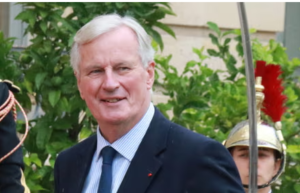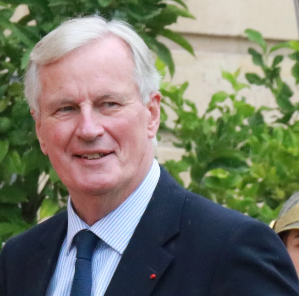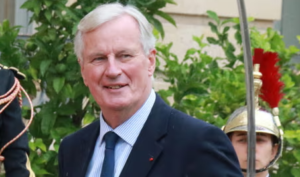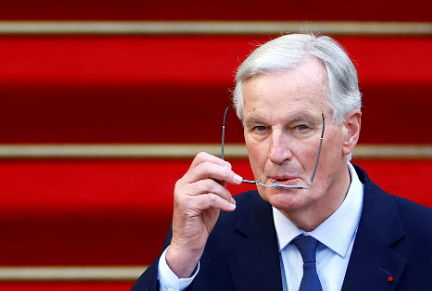Paris, France – September 11, 2024 – France is bracing for further political turmoil as newly appointed Prime Minister Michel Barnier confronts mounting fiscal challenges and the looming threat of far-right influence. Barnier, a seasoned conservative politician and former Brexit negotiator, was appointed by President Emmanuel Macron to stabilize the government after an inconclusive snap election in July 2024. However, his path ahead is riddled with obstacles that could plunge the country into deeper uncertainty.
Barnier’s Immediate Task: Tackling France’s Fiscal Crisis
The Eurozone’s second-largest economy faces a critical financial situation. France’s budget deficit, standing at a staggering 5.5% of GDP in 2023, far exceeds the EU’s 3% limit. Public debt has skyrocketed to over 110% of GDP, forcing Barnier’s government to draft an emergency budget for 2025, slashing spending, and possibly raising taxes.
Failure to meet these fiscal targets could result in punitive measures from the European Commission, with France already requesting a deadline extension to submit its debt reduction plan. This financial strain adds immense pressure on Barnier, who must rally a deeply divided parliament to approve the budget in record time.
Far-Right Influence: A Kingmaker in Parliament
Complicating Barnier’s tenure is the rising power of the far-right National Rally, led by Jordan Bardella and political veteran Marine Le Pen. With 142 seats in the National Assembly, the far-right can dictate the survival of Barnier’s government by either lending or withdrawing support. Analysts warn that Le Pen’s influence could shift the balance of power at any moment, leaving Barnier “under surveillance” by the far-right.
Le Pen’s National Rally has already made clear its demands, pushing for hardline policies on immigration and measures to ease the cost of living. Their role as potential kingmakers has put France in a precarious position, with the possibility of a no-confidence vote that could topple the fragile government.

Political Instability: A Divided France
Barnier’s government faces intense opposition from both sides of the political spectrum. The left-wing New Popular Front (NPF), led by La France Insoumise, is enraged after their candidate was overlooked for the premiership despite winning the largest share of the vote in July’s election. With 193 seats in parliament, the NPF stands ready to challenge Barnier’s every move.
Meanwhile, Barnier’s support within his own Les Républicains party is tenuous, leaving him dependent on Macron’s centrist alliance and a small group of independents. Even with their backing, Barnier has, at best, 228 deputies—far short of the 289 needed for a stable majority.
Economic and Political Future in Jeopardy
France’s fiscal future now hinges on Barnier’s ability to push through a budget that not only appeases the far-right but also addresses the nation’s ballooning deficit. However, experts are skeptical of his chances. Andrew Kenningham, chief Europe economist at Capital Economics, doubts Barnier will succeed, warning that the far-right’s demands, such as tax cuts and reversing Macron’s pension reforms, will complicate budget negotiations.
Adding to the uncertainty, France’s budget deficit for 2024 is projected to reach 5.6%, further straining public finances. As bond yields rise, signaling investor concerns, the country risks plunging into a deeper economic crisis if Barnier’s government fails to deliver fiscal discipline.
Outlook: A Fragile Future for France
Barnier’s tenure as prime minister is precarious at best, with analysts giving him just a 55% chance of remaining in office into 2025. The far-right, while posing as the “responsible” opposition, could at any moment join forces with the left to bring down the government, triggering further political instability.
For now, France’s political and economic future remains uncertain, as Barnier navigates the treacherous waters of fiscal austerity, far-right pressure, and a fractious parliament. Whether he can steer the country away from crisis or succumb to the whims of his opponents will be closely watched in the coming weeks.
Key Takeaways:
- Fiscal Challenges: France’s budget deficit is at 5.5%, and public debt is over 110% of GDP.
- Far-Right Influence: National Rally, with 142 assembly seats, holds the key to Barnier’s government survival.
- Political Instability: Left-wing opposition and far-right power make for a deeply divided parliament.
- Economic Uncertainty: France must slash spending and avoid plunging into a deeper fiscal crisis.

- 1. France’s Fiscal Crisis in Depth
- Deficit Numbers: France’s budget deficit for 2023 was 5.5% of GDP, far exceeding the EU’s Stability and Growth Pact (SGP) limit of 3%. Additionally, France’s public debt stood at over 110% of GDP, in sharp contrast to the EU’s target of 60%.
- Economic Context: The fiscal challenges come in the context of slower-than-expected economic growth. In 2023, France’s GDP growth slowed to around 0.8%, compared to 2.5% in 2022. This has put downward pressure on tax revenues while increasing government borrowing.
- EU Fiscal Rules: Under EU rules, member states are required to submit deficit reduction plans if their budget deficits exceed the 3% threshold. France’s failure to meet these obligations risks triggering the EU’s Excessive Deficit Procedure (EDP), which could impose financial penalties or more stringent economic oversight.
2. Michel Barnier’s Background
- Political Experience: Michel Barnier is a veteran politician with decades of experience. As a former European Commissioner and chief Brexit negotiator, he is known for his diplomatic skills and pragmatic approach to governance. His leadership of the Brexit negotiations earned him significant respect within the EU, but his reputation as a conservative may be polarizing within France.
- Domestic Challenges: Despite his international stature, Barnier’s base of support in France remains narrow. His center-right party, Les Républicains, only holds 47 seats in the National Assembly, far short of the numbers needed for stable governance.
3. Rising Influence of the Far-Right
- National Rally’s Growth: Under Marine Le Pen, the National Rally has steadily increased its support over the years. In the 2024 election, the party secured 142 seats, cementing its role as a key player in French politics. Le Pen’s successor, Jordan Bardella, has continued to broaden the party’s appeal, especially among young voters disillusioned with traditional parties.
- Public Sentiment: National Rally’s rise can be attributed to public dissatisfaction with the status quo. The party’s anti-immigration policies, economic populism, and promises to improve living standards resonate with a significant portion of the electorate. Their ability to leverage this support makes them a powerful force in the current political landscape.
4. Economic and Political Implications
- Potential Economic Fallout: Failure to pass a credible budget could further increase bond yields, raising borrowing costs for France. The 10-year French government bond yield already stands at 2.86%, and analysts fear that this could rise if political uncertainty continues, increasing the cost of servicing the country’s massive public debt.
- Global Market Reactions: International investors are closely monitoring the situation. France is one of the largest economies in the Eurozone, and instability in the country could have ripple effects across Europe. The spread between French and German 10-year bonds, a key indicator of market confidence, currently sits at 71 basis points, but this could widen if Barnier fails to deliver on his fiscal promises.
5. Broader European Context
- Impact on EU Stability: France’s political and economic situation has broader implications for the EU. As one of the key drivers of European integration, any instability in France could weaken the EU’s ability to address common challenges like migration, climate change, and economic governance.
- EU Response: The European Commission’s stance on France’s fiscal situation will also be crucial. While the EU has shown some flexibility with member states facing fiscal pressures, it may take a firmer stance if France’s debt and deficit levels continue to exceed EU rules, particularly as the region is also dealing with economic pressures post-COVID-19.

6. National Protests and Social Unrest
- Protests Against Barnier: The appointment of Michel Barnier has already sparked mass protests across France. The left-wing New Popular Front (NPF), led by La France Insoumise, is rallying against what it sees as the undemocratic installation of Barnier, despite the NPF winning the largest share of votes in the July 2024 election.
- Public Opinion: Surveys conducted by French pollsters in August 2024 showed that 57% of French citizens disapproved of Barnier’s appointment, with only 35% supporting his economic agenda. The protests highlight growing frustration with Macron’s handling of domestic politics and the perceived erosion of democratic processes.
7. Barnier’s Potential Strategy for Survival
- Negotiating with the Far-Right: Barnier may be forced to court the support of the far-right National Rally to survive in office. Analysts suggest that he could agree to implement some of their key policies, particularly on immigration and cost-of-living issues, in exchange for their support on fiscal matters. However, such a deal could alienate Barnier’s center-right and centrist backers, further weakening his government.
- Left-Right Power Struggle: The ongoing tension between the left-wing NPF and the far-right National Rally will likely define Barnier’s premiership. While Le Pen’s far-right seeks to position itself as the “responsible opposition,” the left is unlikely to cooperate, raising the stakes for every parliamentary vote.






